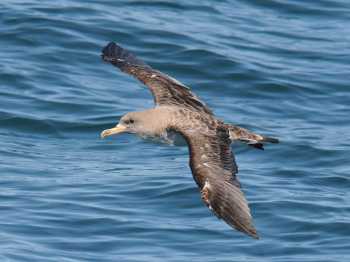Gaia Dell’Ariccia (Behavioural Ecology Group, CEFE, CNRS, Montpellier, France) and colleagues have published open access in the journal Scientific Reportson migratory patterns of Cory’s Shearwaters Calonectris borealis in relation to prevailing winds.
The paper’s abstract follows:
“Wind conditions strongly affect migratory costs and shape flyways and detours for many birds, especially soaring birds. However, whether winds also influence individual variability in migratory choices is an unexplored question. Cory’s shearwaters (Calonectris borealis) exhibit migratory flexibility, changing non-breeding destination across the Atlantic Ocean within and between years. Here, we investigated how wind dynamics affect the spatiotemporal migratory behaviour and whether they influence individual choices of non-breeding destination. We analysed 168 GLS tracks of migratory Cory’s shearwaters over five years in relation to concurrent wind data. We found no evidence for an association of the use of specific paths or destinations with particular wind conditions. Our results suggest that shearwaters deliberately choose their non-breeding destination, even when the choice entails longer distances and higher energetic costs for displacement due to unfavourable wind conditions en route. Favourable winds trigger migration only when directed towards specific areas but not to others. Despite their dependence on wind for dynamic soaring, Cory’s shearwaters show a high individuality in migratory behaviour that cannot be explained by individual birds encountering different meteorological conditions at departure or during migratory movements.”

Cory's Shearwater in the Southern Hemisphere, photograph by John Graham
Reference:
Gaia Dell’Ariccia, G., Benhamou, S., Dias, M.P., Granadeiro, J.P., Sudre, J., Catry, P. & Bonadonna, F. 2018. Flexible migratory choices of Cory’s shearwaters are not driven by shifts in prevailing air currents. Scientific Reports doi:10.1038/s41598-018-21608-2.
John Cooper, ACAP Information Officer, 15 March 2018

 English
English  Français
Français  Español
Español